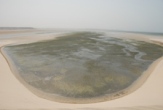Seminar on Human Rights and Environment: Dakhla as an example
As part of its activities related to the promotion of economic, social and environmental rights, the Advisory Council on Human Rights (CCDH) held on October 7, 2008 in Dakhla, south of Morocco, a seminar on "Human Rights and Environment". This meeting is part of the CCDH strategy to deepen the debate on this category of rights in order to specify them in the light of international guidelines and the Moroccan specific context. More than a hundred of participants representing local authorities, regional services, local communes, local associations and the private sector attended the meeting.The seminar was also an opportunity to present the tasks of the CCDH regional office, which has been established in Laayoune, south of Morocco, and highlight the efforts made by the CCDH, particularly in monitoring the implementation of the recommendations of the Equity and Reconciliation Commission (IER) on reparation, awareness-raising about the human rights culture and working towards upholding it in the southern provinces through targeted communication, and active and open participation. During this meeting the focus was on the close relation between human rights and the environment in the region. The CCDH Secretary General, Mr. Mahjoub El Haiba, presented the specifics of the environment law, the concepts relating to the environment, and the goals of preserving nature.
The proceedings of this meeting were held in two workshops: one on the marine environment and another on the terrestrial environment.

During the first workshop, participants focused on the most important features which characterize the marine environment in the region (biodiversity, the vastness and beauty of coasts) and the pressures affecting the marine resources, which are the unorganized and arbitrary exploitation of the marine resources, the failure to comply with existing laws relating to fisheries, waste, non-respect of biological rest, the absence of sufficient scientific studies to develop suitable projects on preserving the marine and coastal environment, lack of adequate control mechanisms that strike a balance between the needs in terms of development and needs to preserve the environment.

During the second workshop, interventions focused on the specifics of the Saharan terrestrial environment: diversity of reliefs, of climate, of water resources, and of fauna and flora.
Similarly, emphasis was placed on the pressures affecting the terrestrial environment in the region: long periods of drought, bad behaviors in the management of water resources, population growth, concentration of population in space, increasing phenomenon of industrial pollution, growth in the amount of solid, liquid and plastic wastes, and expansion of arbitrary fishing...
The two workshops resulted in the following recommendations:
- Revising the legal system in order to preserve the marine environment, coastal areas, living marine resources;
- Developing a national plan to promote the situation of fishermen working in the region;
- Building the capacity of civil society activists to allow for a national and international cooperation as regards preserving the marine and coastal environment;
- Creating a national park whose priorities would be to preserve wildlife and endangered birds;
- Investing in alternative energy (solar, hydro, wind);
- Developing training programs for stakeholders in the field of environment;
- Encouraging scientific investigation;
- Organizing events on the environment;
- Developing communication policies;
- Integrating environmental culture in local education curricula.
The CCDH will send these recommendations to the various services involved in their monitoring and implementation.






















